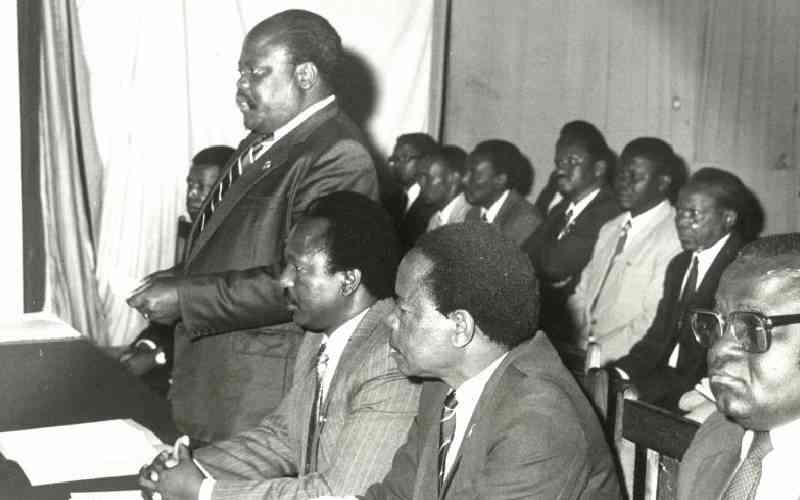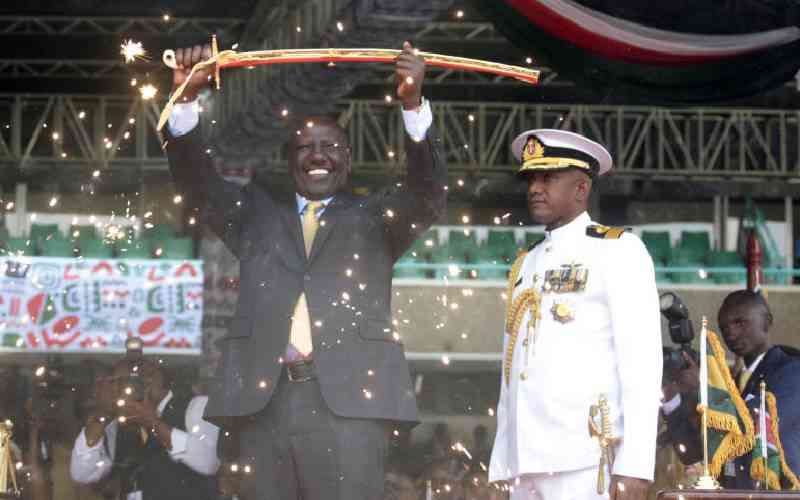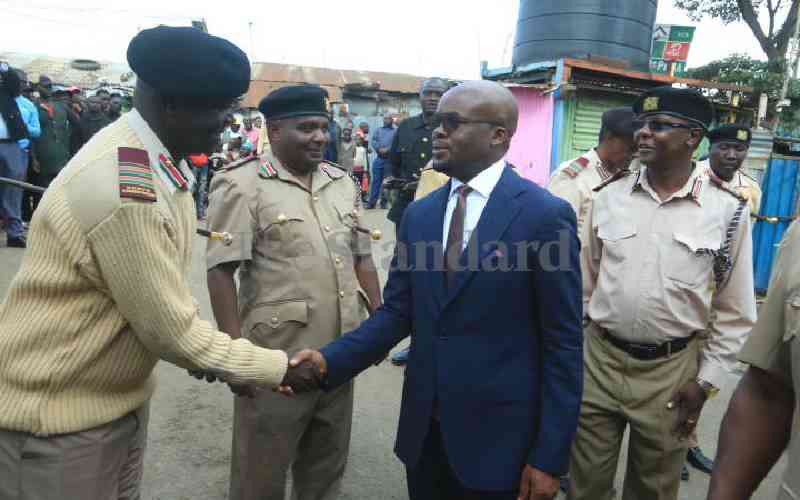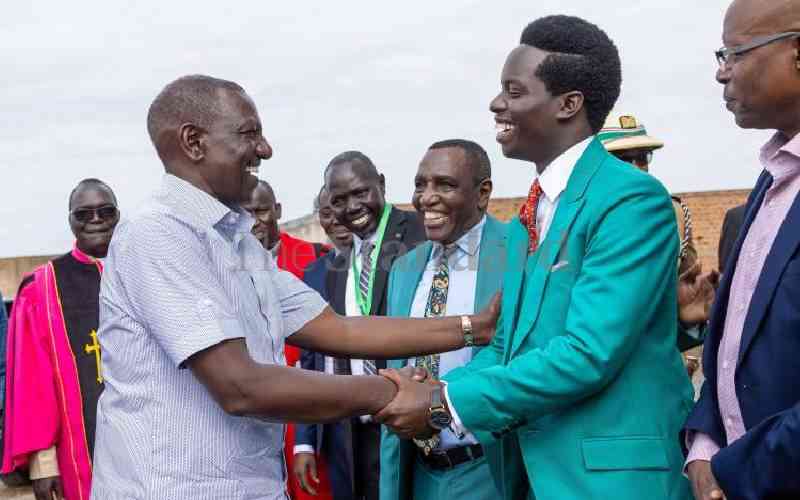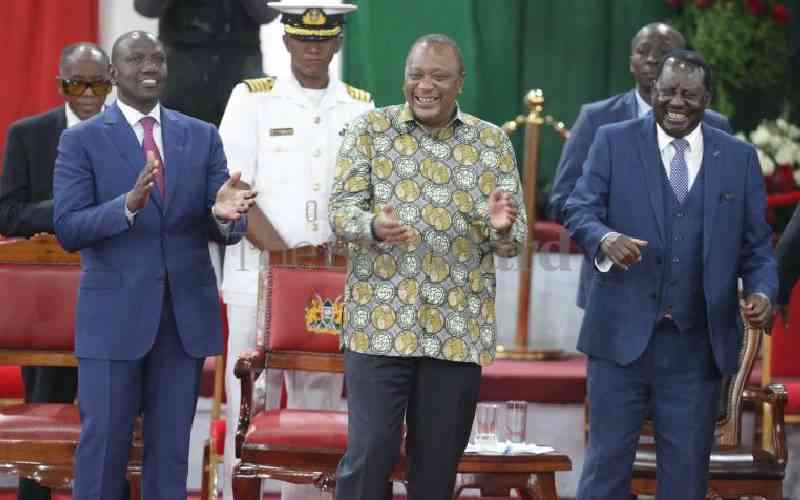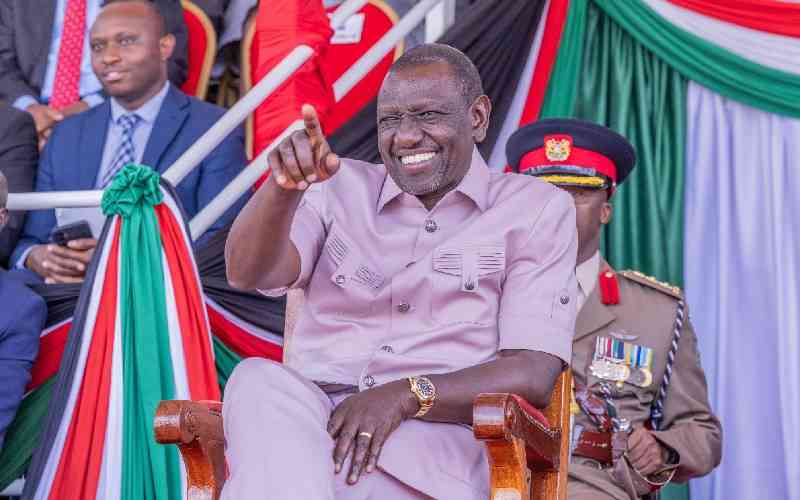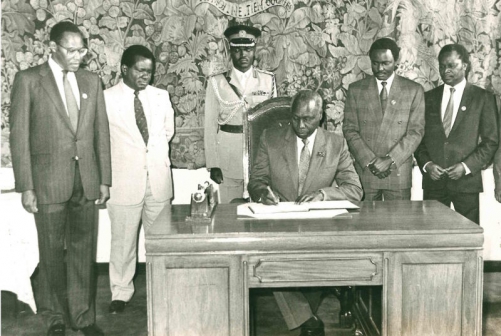
Editor gives an exclusive account of dealing with Total Man and the then VP, including the day they were angered by then Ugenya MP James Orengo who referred to them as hyenas in Parliament.
The debate on the Budget speech in Parliament delivered the previous day by then Finance Minister Musalia Mudavadi was lively and engrossing. Most members were happy President Daniel arap Moi had finally taken away the Finance docket from Vice President George Saitoti, he of the Goldenberg notoriety, and given it to the son of Moses Substone Mudamba Mudavadi or simply the ‘King of Mululu’.
But as they heaped praise on the young man, currently one of the key pillars in NASA, the then fiery Ugenya MP James Orengo noticed something that caused him discomfort – Mudavadi was seated between Saitoti and Kipyator Nicholas Kiprono Biwott. Total Man, as he had baptised himself, was revered in Kanu and loathed by the Opposition.
Orengo, in his usual cheeky manner albeit with powerful oral prowess, also praised Mudavadi, but then he had one final advice for him; “You are a fine and untainted man. You will go far but only, only if you stop sitting between hyenas!” Piqued by the analogy, Biwott and Saitoti jumped to their feet on a point of order.
Speaker Francis Kausai ole Kaparo caught their eyes, as they say in Commonwealth parliamentary democracy, and acted on their protestation at being compared to hyenas. He forced Orengo to apologise and after taking him in circles, the current Siaya Senator (who is also unchallenged for the term starting after August) made one hilarious concession and walked out of the Chamber before he was thrown out: “I apologise to all the hyenas in the House!”
Maths genius
Something told me if he had not been to school and proven himself a Maths genius, Saitoti would have ended up in jail for assault at one point in his life because there were times he could get so angry. Those who knew him can attest he must have contemplated literally going for Orengo’s balls that day. Why? How could he call a VP and the President’s right-hand man, Biwott, hyenas?
But Orengo would soon be back when a censure motion against Saitoti was on. Biwott was the professor’s most fierce defender, alongside other tough-talking Kanu politicians including Joseph Kamotho, William ole Ntimama, Dalmas Otieno, Kipkalya Kones, Simeon Nyachae and Jackson Itirithia Kalweo. This time, Orengo looked at Biwott’s searing eyes, he who he had claimed killed Dr Robert Ouko, then turned to Saitoti (again as usual the two were sitting next to each other) and said: “I pity Prof Saitoti, he thinks he is Moi’s preferred choice of successor. I want to tell him he is simply the ‘presumptive heir’ and Biwott the ‘heir apparent’!”
Years earlier
Those days, such a statement could easily land you in detention but somehow Orengo, who had years earlier fled to Tanzania alongside his colleague, controversial and outspoken Chelagat Mutai to escape detention, always got away with poking the nose of the two most powerful Kanu men besides President Moi.
Orengo did not stop there. He said Saitoti did not brew the Goldenberg Scandal alone and argued, “even in court, when you catch one thief, you charge him ‘alongside others who are not before court.” He said the ‘others’ included Biwott, who was looking at him in a manner suggesting if it were not for the live audience, he would wring his neck and throw the head down Cheploch Gorge in his Keiyo-Marakwet neighbourhood.
The point is Biwott and Saitoti, two great buddies who later became casualties of Moi’s choice of Uhuru Kenyatta, then a mere nominated MP, were the lynchpins of Kanu and playing with them was akin to kissing naked electric wires. Uhuru would later be whitewashed by Mwai Kibaki in the 2002 elections.
And these men had weird habits regarding precautions they took against possible assassinations. Biwott would not serve himself food at the Bunge cafeteria but he would still eat anyway. His trick was simple; he would either join MPs already served at a table and pour for himself their tea or just direct waiters rushing tea and snacks to another table to give him and then go back for a fresh order.
But then something weird happened; Saitoti disappeared from the scene and talk was rife he had been poisoned. Of course the Government denied and talking about it was akin to treason. But one day, Moi turned up, for a roadside function outside GPO on Kenyatta Avenue, and in the middle of lambasting his critics, declared, ‘the same people who killed Ouko are the same ones who poisoned my Vice President (Saitoti)!”
Stay informed. Subscribe to our newsletter
The disclosure shook the nation but details would follow when Saitoti, after abandoning Moi and Biwott to join the Opposition (alongside Mudavadi before he changed his mind to go back to Kanu and take up Saitoti’s office for only three months), spilt the beans. He confessed he had been poisoned and that he had lost his skin and what he had was a new one.
Trusted doctors
One of his aides who lived in a block at Nyayo Highrise, Kibera, had earlier told me that after Saitoti was poisoned, he refused to be taken to Nairobi Hospital, claiming those who wanted to kill him, whose names he did not reveal, would catch up with him there. He insisted he be taken to his Lavington home. His doctor flew in from Malindi to take care of him. While airborne, he organised for one of Saitoti’s rooms to be transformed into a hospital ward, complete with life-saving equipment. He also had other trusted doctors attend to Saitoti till he arrived. ‘When Moi came to see professor, the first thing he did was to chide him; “Nilikwambia uwache kula ovyo ovyo na unajua adui yako!” Between themselves, the big two clearly seemed to know who had poisoned the VP.
The paranoia and fear of murder forced Saitoti to take more complex precautions. Like Biwott, he stopped eating in public unless with random pick from a ‘friend’s’ plate or having someone else taste the food before he ate it. A former senior official in the Moi administration said Saitoti, discouraged by a warning to his food tasters by a PS that they risked dying, switched to using dogs and cats. The diplomatic nightmare was when he was to travel abroad, either of the pets would have to be with his advance security party. Of course, the wazungu’s thought Saitoti was a rare African in love with cats and dogs, not knowing the real story behind them.
But Moi also had a contradicting view of the two allies. Whereas they were feared because of their proximity to him, he also kept some distance from them, something that would soon play out publicly years later. A senior Intelligence officer once told me of how Moi had insisted that all his ministers be monitored and one day Biwott protested. Moi cunningly admonished the Intelligence guy before Biwott but after they left he followed it up with the call; “Kijana fanya kazi yako vile unajua!” (Do your work the way you deem it fit!)
He would later by-pass Saitoti for Uhuru, arguing he knew them too well and knew who among those in the dais was fit to rule. Those with Saitoti at the dais then included Total Man, Kamotho, Musalia, Biwott and Kalonzo Musyoka and Raila Odinga who was ‘cooperating’ with Kanu. Except Biwott, the rest crossed over to Railway Club weeks later to join the Opposition. The team would extinguish Kanu’s lamp that had been alive since independence. But one came back, became VP for three months then was vanquished to oblivion in the December elections, earning himself the sarcastic nickname, ‘Simon Makonde”.
For years, Moi was seen as dependent on Biwott politically, but then this is the man who had him locked up following pressure to act on suspected Ouko killers. He would later rehabilitate him and shocked Kenyans when, at a function in Uasin Gishu (venue was one of Biwott’s known home), he jokingly said: “If you think you are Biwott’s friend, I’m also one. But I also don’t know where he lives!” It turned out Moi who made Biwott the powerman from a DO’s office had also been a victim of Biwott’s elusive and secretive life.
This also lent credence to a rumour that the palatial home where Biwott met his guests and delegations in Lavington (or was it Kileleshwa) was not his home but that of an introvert MP, from his district, whom he had helped to join Parliament.
Potential headline
A few months after Kanu lost power, Biwott sought me out and I was excited because my mind went abuzz with the potential headline – ‘Biwott: Our lives after handover’. Through his aide William Chepkut, he asked that we meet in the office of lawyer Stephen Kipkenda. The lawyer is Total Man’s family spokesman in the ongoing funeral arrangements.
I checked into the lawyer’s office at Teleposta Towers and soon I was facing Total Man. With his usual low-tone voice and staccato sentences, I soon realised there was something else in his mind. So I cut in and asked him if he could tell me about how he felt when Kanu fell with the defeat of Uhuru in 2002 and life outside power. “Kwa len ing’om!”, he exclaimed. (I thought you were a bright man).
He then went on: “This is not the time for us Kalenjin to speak, we are not the ones in power. Let those in power speak.”
That then explains why he lay low after that fall and wherever he said anything political, it would be capped with the rider that he supports the Government. That is how he weathered through the Kibaki and Uhuru administration. Well, what he wanted was a newspaper cutting of the day when he took a visiting French delegation to Turkwell Hydro-Electric Power Station. He needed it the same day. When I got to our library, I was astounded because the newspaper story and picture was key to his defence over links to Ouko murder. It was a good alibi for him. He met you on his terms, and for journalists, when it was to his advantage.
In the early years, Biwott had been accused in Parliament, alongside Kanu nominated MP Rashid Sajjad, that they set off 1997’s Likoni clashes. Biwott had been there over the weekend for what he said was a harambee for women groups. He denied claims he was carrying a suitcase full of money, instead saying he in fact had a suit bag, the kind kept in high-end clothes shop. Questions were asked why he would carry a suit in its bag from Eldoret to Likoni and he simply said he wanted to change into them when he landed.
Well the next day he was given opportunity to make a personal statement to MPs and he vigorously defended himself. I was busy taking notes from the press gallery above him that evening. When he finished, we went out to file the big story. But then at the press room, I found his bodyguard waiting for me. He told me mkubwa wanted to see me. So out we went and found him in the car park. “Habari ya kijana?” he greeted me.
He walked me away from people’s ears saying he knew I was the one doing the story and he wanted to know how I would approach it. Being an unethical question, I told him I would pick quotes from his statement and contextualise it. That is when his intentions came out; “I want it to run the way it is as a headline.”
Knowing the Nation Media Group, I told him that was impossible. But that word was not in his glossary. He asked me who he should talk to and I gave him the direct land line of my Managing Editor. He thanked me and left as I walked towards Nation Centre. On arriving at the office, my boss called me over to his desk for a briefing. He then told me to forget doing the story. “Just give his statement to the copy takers and write one introductory paragraph and go home,” he said and turned away to his computer. I was stunned. But true indeed the following day, just after my paragraph was the line – ‘The following is Biwott’s statement in full’.
Presidential functions
Our high school used to host presidential functions and at young age, we noticed something about Biwott. He would leave the dais, walk to the back and smoke his long cigars. No one dared take pictures and I am almost certain few kno w he, at one point, was a heavy smoker. But the point was that the man was smoking at an arm’s-length from Moi and how he had the guts to do this baffled us for no one else could do this and still go and sit next to him or even ride in his Volkswagen Kombi.
I bumped into Biwott on three other memorable occasions. The first was at the burial of former MP Benjamin Kositany. He found me chatting with Lee Njiru and asked where I had disappeared, because he had not been seeing me at the press gallery of Bunge lately. I told him I had been transferred to Kisumu. He looked at me then said: “That is good because those Kikuyus were using you to write bad stories on Kalenjin leaders!” That was vintage Biwott, he was so protective of Moi and fellow leaders.
But then, because at the time the HIV/Aids prevalence in Kisumu was high, he looked at me and said: “Kijana, pale hakikisha umechimba kisima chako ndio ukunywe maji yako mwenyewe”. (Dig your own well so you drink from it alone, in other words marry).
Three months ago, I was at Nairobi Hospital for a check-up following a surge of blood pressure. I found him standing at the entrance with his guard. He was waiting for Chepkut to bring the car from the parking. He looked frail and his voice low and husky. I felt it, he was a different and tortured man. But then he asked what the problem was. I told him and he asked if I take alcohol. “Pombe ni mafuta ya blood pressure,” he said. (Alcohol worsens hypertension).
He then said something I am yet to check out after asking me if I drink a lot of water. “Water is bad for blood pressure,” he said and when I asked why, he said it increases the volume of blood thereby giving the heart more work.”
His car came and we walked down. He walked slowly and seemingly painfully. Getting into his car was a strain, he later waved at me and said, “enda andika gazeti lakini andika ile inasaidia.”
That was the last time I would see the man I had written good and negative stories about. And that is the nature of my work since I started journalism about two decades ago. Biwott was the centre of stories on Moi and Kanu, and they were plenty: Ouko, Goldenberg, Trade Bank, Masinde Muliro (who he shared fa light with and died on arrival at JKIA), Maria Soti School land, war on opposition and many others.
Gone he is but maybe in the afterlife he is doing a review of how life was on earth with his friends Saitoti, Kamotho, Kones, Mark Too and GG Kariuki, whose body incidentally is with his at Lee Funeral Home. And he must be telling them how lonely power is and the many things that transpired after they left before him. But in all of them, those of us left behind learn that death is non-discriminatory, inevitable and chooses its own time and method of striking.
Journalistic life
Gone with him are the reasons why he lived such a secretive and shy life yet to many, he had the heart of steel and the bravery of a Spanish matador. You, of course, noticed that even in death, his newspaper death adverts bear not the names of his wife or wives, children, in-laws or even brothers and sisters. That was him, quite unlike many. I mourn him because he is part of my journalistic life, but the stories of Total Man won’t end.
RIP Karnet.
Mr Tanui is the Standard Group Deputy Editorial Director and ME
[email protected]
 The Standard Group Plc is a
multi-media organization with investments in media platforms spanning newspaper
print operations, television, radio broadcasting, digital and online services. The
Standard Group is recognized as a leading multi-media house in Kenya with a key
influence in matters of national and international interest.
The Standard Group Plc is a
multi-media organization with investments in media platforms spanning newspaper
print operations, television, radio broadcasting, digital and online services. The
Standard Group is recognized as a leading multi-media house in Kenya with a key
influence in matters of national and international interest.
 The Standard Group Plc is a
multi-media organization with investments in media platforms spanning newspaper
print operations, television, radio broadcasting, digital and online services. The
Standard Group is recognized as a leading multi-media house in Kenya with a key
influence in matters of national and international interest.
The Standard Group Plc is a
multi-media organization with investments in media platforms spanning newspaper
print operations, television, radio broadcasting, digital and online services. The
Standard Group is recognized as a leading multi-media house in Kenya with a key
influence in matters of national and international interest.




